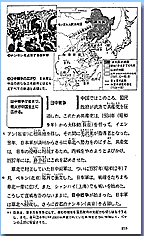| The Sino-Japanese War begins, and war spreads
throughout China. |
In China at this time, the Nationalist government put pressure
on the Communist party with military force. Thus, since 1934
(Showa 9), the
Communist party made a big movement (long march), and moved
the headquarters to Ienan (Chinese spelling), and during this
time Mao Zedong became leader. The next year, the Japanese military
from Manchuria and moreover, North China, gathered strength
and so,(1) the Communists, in order to oppose the Japanese occupation,
called for an end to civil war and in 1937, Chiang Kai-shek
was forced to accept.
In North China, the opposing Japanese and Chinese militaries
at last encountered each other in the suburbs of Peking (Chinese
spelling) on July 1937 (Showa 12). The
Japanese military immediately began to expand the battleline
to all of North China and also began to fight in Shanghai (Chinese
spelling). Thus, the Sino-Japanese War began without a declaration
of war. The Japanese military invaded North China, and furthermore,
occupied the capital Nanking.
1 Japan, with military power in the background, tried to separate
the North China region from the ruling Nationalist government,
and reinforced the military more as well as stationed a military
garrison in the Peking suburbs ever since the Boxer Rebellion.
|


